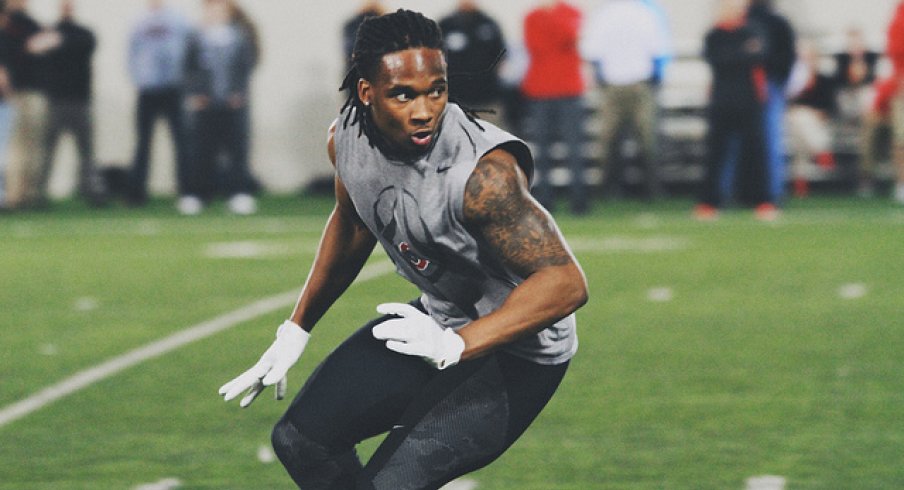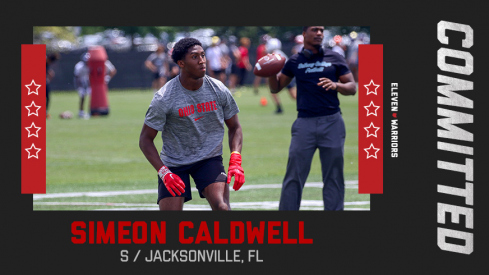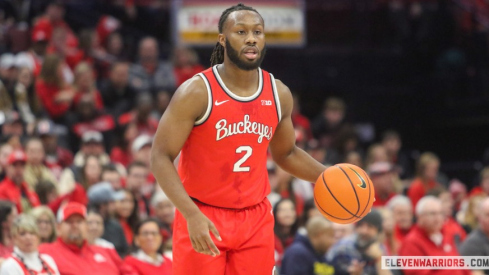Ohio State adds another top-100 safety as Simeon Caldwell commits to the Buckeyes.
Bradley Roby solidified his status as a first-round draft pick in February. A combine performance that included a 4.39 40, 4.04 20-yard shuttle, 38.5-inch vertical and 124-inch broad jump put an end to lingering doubts about his underwhelming junior season.
Then came the early morning hours of April 20.
Roby was cited for operating a vehicle while intoxicated after police found him passed out behind the wheel of his car. He eventually agreed to a plea deal with a reduced charge of physical control of a motor vehicle while under the influence of drugs or alcohol. But the damage to his draft stock was done.
It’s unclear if Roby will fall out of the first round. It takes just one team to give a player an opportunity. What the offense did to Roby was shed light on his judgment, which can be deemed questionable. While wrongdoing wasn’t proven in his case last summer in Bloomington, Ind., a pattern of poor decision-making exists. In an NFL that puts a premium on character, first-round money for Roby could be a risk.
“I'd be real nervous to pull the trigger on him because I don’t know what I’m getting,” said ESPN draft analyst Todd McShay, who labeled Roby as a classic boom or bust prospect. “He’s a wild card. He could be the best defensive back in this class five years from now or he could wind up being another first-round cornerback that doesn’t pan out in the league because he didn’t do what he had to do mentally and from a preparation standpoint.”
But Roby’s physical skills, from his speed to sheer athleticism, cannot be diminished. McShay said he could be the most talented cornerback in the entire draft and Mel Kiper Jr. has him rated No. 39 overall on his big board. A year ago, Roby almost certainly would have been even higher, possibly a mid-first-round pick.
Instead, he chose to return for his redshirt junior season. It turned out to be less productive than his first two years, but Roby isn’t one to have regrets. After a rookie campaign that saw him lead the team in interceptions and record the second-most pass breakups, Roby soared during his sophomore season.
His 1.4 pass breakups per game – 17 total – led the nation. He also had 63 tackles, third most on the Buckeyes. When the NFL came calling, Roby waited until January – two months after the season ended – to make his decision. Ultimately, the allure of a national championship and adding a Thorpe Award to the bulging trophy case inside the Woody Hayes Athletic Center couldn’t be passed up.
“I talked to a lot of people and got a lot of opinions – players, coaches and people close to my life,” Roby said. “At the end of the day, I felt like you’re only in college one time, why not enjoy it? I know the NFL will always be there, so I may as well come back and push myself to see how great I could be.”
The stumbles came before the season even started. In a year when Roby’s stated goal was to enhance his leadership qualities, he was arrested and charged with battery at a bar near the campus of Indiana University. He was eventually cleared, but head coach Urban Meyer still suspended Roby one game for putting himself in a bad situation. Something Roby greatly coveted also became extinct: team captaincy.
“I have a clear set of core values in place that members of this football program are constantly reminded of and are expected to honor,” Meyer said. “There are also expectations with regard to behavior. I expect our players to conduct themselves responsibly and appropriately and they will be held accountable for their actions.”
Disappointed but resolute, Roby emerged from his public shaming and became a sounding board for freshmen Eli Apple, Cam Burrows and Gareon Conley. The trio of true freshmen sought out the All-American because reaching his level of play is the objective.
Mentor was a role Roby happily took on. When he came to Ohio State, Chimdi Chekwa, Devon Torrence and Travis Howard offered the same umbrella filled with knowledge. The helpful hand Roby extended made him a popular figure among teammates.
“He’s like another coach out there,” fellow cornerback Doran Grant said. “It’s crazy, the knowledge of the game he has. That’s why I try to always be around him.”
The entirety of Roby’s 2013 season could be summed up as frustrating, though he did earn first-team All-Big Ten honors. In nationally televised games against Cal and Wisconsin, Roby and the Ohio State secondary were burned for 666 yards and five passing touchdowns. But it was the Wisconsin game in particular that damaged Roby’s pride.
Jared Abbrederis had 10 catches for 207 yards and a touchdown, with Roby coming under fire from critics. He and Meyer pointed out the game plan was to stop the run, which Ohio State did – the Badgers gained 104 yards rushing. The result was Roby being all alone to stop Abbrederis.
Roby sat out of the Orange Bowl with a knee injury in what could have been a redeeming performance, denying fans and scouts a Roby-Sammy Watkins matchup.
“I think he’s the most athletic cornerback in the draft. He can be as good as he wants to be at the next level,” McShay said. “I think he could have been coached better. I think his eye discipline was terrible. I think he lacks personal discipline. Discipline with him on and off the field will be very important. The team that drafts him better have a good position coach and better have some veteran leaders around him that can keep him on the straight and narrow. He’s not a bad guy, but he’s got some immaturity, and he needs to grow up fast because he’s got so much talent.”
Better coaching seems to be a knock on cornerbacks coach Kerry Coombs. The questions are warranted after the pass defense struggled for consecutive seasons, bottoming out last year with a ranking of 112th. But Roby points to Coombs as someone who’s made him a better player, whether it’s studying film, limiting wide receivers’ production or growing into a leader.
“When the coach has juice and intensity, it makes football fun,” Roby said. “When you can go out there and be yourself, it makes the game fun and that’s what Coach Coombs does. He has been one of the best things to happen to me. He came along at the perfect time. He approaches the game with a whole different aspect. I think he’s the best corners coach in the country. He’s a winner at every level wherever he goes. He inspires me.”
Early in the 2013 season, Roby admitted to having buyer’s remorse on returning to school. Combined with the criticism it became the most difficult season of his career. Looking back, he believes pundits provided a spark that led to a rededication of sorts.
“If you forget what happened to you in the past, then you're bound to repeat it,” Roby said. “I just want to keep that in my mind. I use that on the field.”
Said Meyer: “He catches a lot of people in his ear, people saying, ‘You know, you could have done this, you could have done that.’ Then after you’ve been told that for so long, I think that he went through a little bit of a funk.”
Months after rave reviews at the combine, Roby is again mired in a funk. It’s come from off-field transgressions that have led GMs to second-guess his value. The talent is undeniable, the work ethic is present; where is he mentally?
“Roby is a great talent, I mean phenomenal talent,” Kiper said. “A couple years ago I thought he might be a top 15 pick. He may well be in the top 25-32. He may be a solid first-rounder, which I think he is. I just think you saw inconsistency in terms of tackling. Good run support, but tackling in the open field was inconsistent. Coverage was inconsistent.
“If he puts it all together, he could be a heck of a player. But right now, I think he’s a little overrated.”
In five years, the vote on Roby will be split. He’s the one who will check off bust or success.


